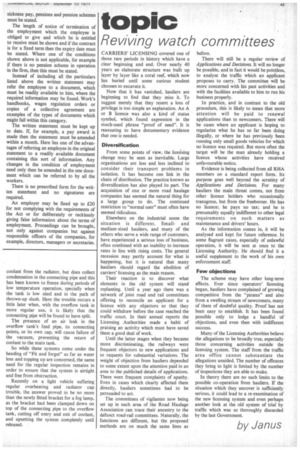t op i c
Page 47

If you've noticed an error in this article please click here to report it so we can fix it.
Reviving watch committees
CARRIERS' LICENSING covered one of those rare periods in history which have a clear beginning and end. Over nearly 40 years an elaborate structure was built up layer by layer like a coral reef, which now lies buried until some curious student chooses to excavate it.
Now that it has vanished, hauliers arc beginning to find that they miss it. To suggest merely that they resent a loss of privilege is too simple an explanation. An A or B licence was also a kind of status symbol. which found expression in the much-used phrase "proof of need". It is reassuring to have documentary evidence that one is needed.
Diversification From some points of view, the licerising change may be seen as inevitable. Large organizations are less and less inclined to consider their transport problems in isolation. It has become one link in the chain of distribution. The practice known as diversification has also played its part. The acquisition of one or more road haulage companies has seemed the natural thing for a large group to do. The continued restriction to "normal user" must often have seemed ridiculous.
Elsewhere on the industrial scene the situation is different. Smalland medium-sized hauliers, and many of the others who serve a wide range of customers, have experienced a serious loss of business, often combined with an inability to increase rates in line with rising costs. The general recession may partly account for what is happening. but it is natural that many hauliers should regard the abolition of carriers' licensing as the main reason.
Their reaction is to discover what elements in the old system will stand replanting. Until a year ago there was a network of joint road and rail committees offering to reconcile an applicant for a licence with any objectors so that they could withdraw before the case reached the traffic court. In their annual reports the Licensing Authorities made a habit of praising an activity which must have saved them a good deal of work.
Until the latter stages when they became more discriminating, the railways were frequent objectors to new applications and to requests for substantial variations. The weight of objection from hauliers depended to some extent upon the attention paid in an area to the published details of applications. There were frequent complaints of apathy. Even in cases which clearly affected them directly, hauliers sometimes had to be persuaded to act.
The committees of vigilantes now being set up in each area of the Road Haulage Association can trace their ancestry to the defunct road-rail committees. Naturally, the functions are different, but the proposed methods are on much the same lines as before.
There will still be a regular review of Applications and Decisions. It will no longer be possible, and in fact it would be pointless. to analyse the traffic which an applicant proposes to carry. The committee will be more concerned with his past activities and with the facilities available to him to run his business properly.
In practice, and in contrast to the old procedure, this is likely to mean that more attention will be paid to renewal applications than to newcomers. There will be cases where an applicant is hoping to regularize what he has so far been doing illegally, or where he has previously been running only small goods vehicles for which no licence was required. But more often the target will be the man already holding a licence whose activities have received unfavourable notice.
Evidence is being collected from all RHA members on a standard report form. Its purpose goes well beyond the scrutiny of Applications and Decisions. For many hauliers the main threat comes, not from other licence holders who occasionally transgress, but from the freebooter. He has no licence; he pays no tax; and he is presumably equally indifferent to other legal requirements on such matters as maintenance and drivers' hours.
As the information comes in, it will be analysed and kept for future reference. In some flagrant cases, especially of unlawful operation, it will be sent at once to the Licensing Authority. He should find it a useful supplement to the work of his own enforcement staff.
Few objections
The scheme may have other long-term effects. Ever since operators' licensing began, hauliers have complained of growing competition from the -pirates" and also from a swelling stream of newcomers, many of them of doubtful quality. Proof has not been easy to establish. It has been found possible only to lodge a handful of objections, and even then with indifferent success.
Many of the Licensing Authorities believe the allegations to be broadly true, especially those concerning activities outside the licensing system. The staff from the traffic area office cannot substantiate the allegations unaided. The number of offences they bring to light is limited by the number of inspections they are able to make.
In theory there are no such limits to the possible co-operation from hauliers. If the situation which they uncover is sufficiently serious, it could lead to a re examination of the new licensing system and even perhaps another look at the old system of trial by traffic which was so thoroughly discarded by the last Government.
by Janus




























































































